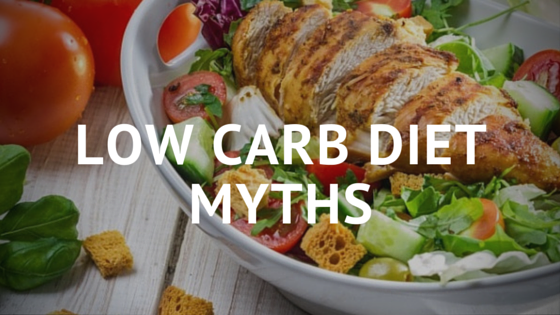
Carbohydrates, similar to fats, have been viewed as the enemy for many years.
While we now have discovered the real health benefits surrounding both macronutrients, there are still some out there who choose to eat on the lower end of the carbohydrate spectrum.
Though once viewed as a fad diet, following a low-carb diet plan has several health benefits and can be a successful path to weight loss for some.
Unfortunetly, there are still quite a lot of myths surrounding the low carb lifestyle. Read on to de-bunk some of the most popular low carb diet myths!
Myth #1 – Low carb diets are just a fad
While some people might switch to a low carb diet in order to drop a few pounds, low carb diets have become more of a lifestyle now than a diet, with more and more people choosing to stick to a low carb style of eating.
Fad diets are typically described as those crash weight loss diets that gain popularity immediately but then fizzle out as more and more people realize they don’t work.
The low carb lifestyle is the exact opposite in that, while initially it began as a way for poeple to drop weight quickly, it has progressed and evolved over time into a manageable way of eating for some.
Myth #2 – Low carb means no carbs
One of the biggest misconeptions about low carb diets is that there is little to no carbohydrates allowed.
You might even hear someone state that low carb diets are trying to eliminate carbohydrates all together.
The truth is that all low carb diets are different, and while some do recommend a very low amount of carbs, this typically only lasts for two weeks before more carbohydrates are added back into the diet.
It is advised by the National Academy of Sciences to eat between 45% and 65% of your diet in the form of carbohydrates, which is the percentage that most low carb diets stay between.
Myth #3 – Low carb diets don’t allow fruits and vegetables
Since most fruits and vegetables are primarily made up of carbohydrates, there is a misconception that these foods are not allowed in a low carb diet.
The opposite is in fact true, with non-starchy vegetables taking the place of whole grains most commonly.
The fact is that those who eat low carb tend to eat even more fruits and vegetables as those foods tend to make up the bulk of their meals, replacing other carbohydrate sources such as bread.
Myth #4 – Low carb diets are bad for your heart
The misconception here is that if you aren’t eating the bulk of your calories in the form of carbohydrates, then you must be eating nothing but fatty meats.
While protein and healthy fats do get pushed to the forefront of a low carb diet, the point of this lifestyle is to make wiser choices in every aspect.
Sources of protein should be lean meats, and fats should come from healthy sources such as nuts, avocados, and even low-fat dairy sources.
Myth #5 – Low carb diets only cause water weight loss
Carbohydrates are stored as glycogen in the body, which has a tendency to hold water.
When carbohydrates are cut, so are the glycogen stores in the body, thus allowing for some of that stored water to be released.
This is why low carb diets tend to lead to a substantial amount of initial weight loss and why so many find it attractive to begin with.
While low carb diets due prompt water loss, a sustatined low carb diet leads to more than just water weight lost.
One six-week long study of a low carb diet revealed that the participants lost almost 8 pounds of fat, while still gaining muscle.
Studies also show that the fat loss from low carb diets tends to be from the abdominal and belly fat areas, an area that is often the hardest to lose from.
Myth #6 – The brain needs carbs to function
While the brain does need a certain amount of glucose in order to properly function, it can also function just as well on ketones instead.
If done properly, the reduction of carbohydrates in the body will lead the brain to stop using glucose stores and start using ketones instead.
That being said, some parts of the brain do still require some glucose to function properly.
This is why a good low carb diet would never advocate a 100% carb free lifestyle.
Though these diets do preach a lower consumption of carbohydrates, some carbs in the diet are necessary for the body to continue running properly.
Myth #7 – Low carb diets hurt physical performance
Many athletes prep for a big game or race by consuming as many carbohydrates as they can the day before, which has come to be known as “carb-loading.”
This is because the body uses primarily glycogen stores as it’s energy source, which makes having enough glucose stored up in the body an essential part of an athlete’s training regimen.
A reduction in carbohydrates will lead to reduced physical performance, but only in the beginning.
Once the body begins to use fat stores as the main source of energy instead of glucose, physical performance will once again return to its normal rate.
This is espcially true in endurance sports as studies have shown, as long as the athlete is given a few weeks to adapt to the lower amount of carbohydrates.
Conclusion
There are a lot of myths and misconceptions about low carb diets, but whether you agree with them or not, they can have some powerful health benefits.
Low carb diets can be effective for those with obesity and even type 2 diabetes, however they are not the answer for everyone.
Enjoyed Low Carb Diet Myths? Share it with your friends so they too can follow the Superfoodsliving journey.
Share on Pinterest
